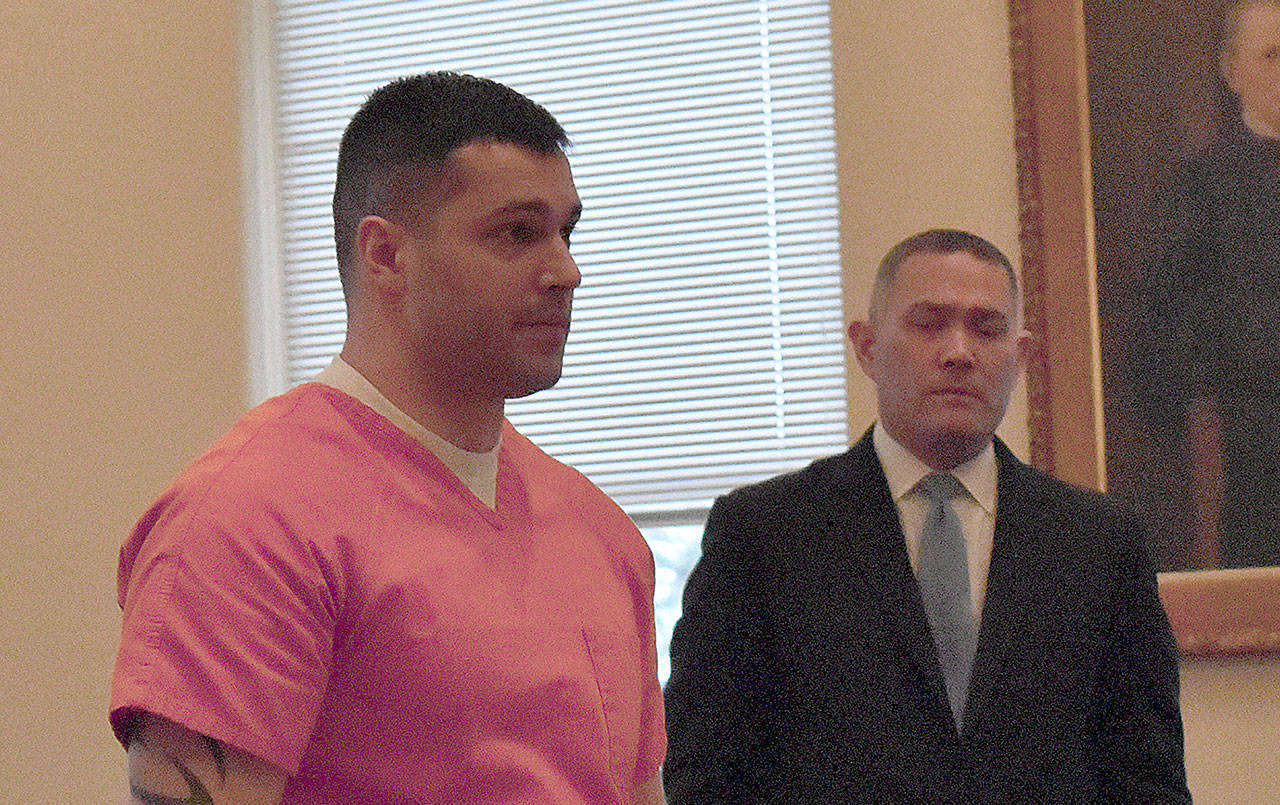A 31-year-old Aberdeen man was sentenced Wednesday to 20 years in prison for the shooting death of a Hoquiam man at a Humptulips River boat launch in August 2018.
Daniel Stephen Heyting pleaded guilty Nov. 25 to the second-degree murder of Andrew Detwiler, 35, of Hoquiam.
The courtroom gallery was nearly full for the sentencing hearing, split by a center aisle between dozens of friends and family of both Detwiler and Heyting. The courtroom fell silent as Heyting was led in, wearing a county-issued orange jail jumpsuit.
Prosecutor Katie Svoboda called for the maximum sentence, 25 years, saying that Heyting has shown “no true remorse” or taken responsibility for shooting Detwiler several times with a .22 caliber handgun. She said he’d changed his story several times in the year and a half since the murder, stating at first he was clean and sober at the time of the murder, now arguing he was “spun out on drugs and acted in self defense.”
Prior to her statements, Svoboda asked several of Detwiler’s friends and family members speak. Two young women fought through tears as they described Detwiler as a “brother,” saying he was “outgoing, funny” and supportive of them through their own struggles.
“My life was forever changed the day we met and the day he was taken from me,” said one.
“He was the best friend to all who knew him,” said another, adding Detwiler “trusted that man (Heyting), and considered him a friend.”
Detwiler’s mother, Traci Whitbeck, struggled as she addressed the judge.
“He deserved so much better,” she said. “He trusted that kid,” she said of Heyting.
She questioned Heyting’s position that drugs caused him to lose control the night of the murder. “My son was an addict for 10 years and never murdered anybody.” She said Heyting “shot my son in the face three times. I never got to see him again.”
Heyting’s parents, Holly Jackson and Michael Heyting spoke on behalf of their son.
Jackson told Superior Court Judge David Edwards that the opioid epidemic and lack of treatment options played a factor in her son’s quick descent into addiction.
“I’m broken hearted my son is in jail but am very grateful he is clean,” she said. She said she believed her son would be a model inmate, that he “made a terrible choice and knows he has to pay for it,” and asked Edwards to “allow him to come home to me before I am gone.”
Michael Heyting broke down when he described his “heartfelt, sincere condolences” to Detwiler’s friends and family. He and Jackson talked about their son’s close relationship with his own 5-year-old son. Michael Heyting asked for compassion and that his son receive the shortest sentence possible.
Defense attorney Erik M. Kupka asked for the minimum sentence, 17 years, saying the case was “tragic at every level” for all involved and “represents another example of the opioid crisis. That’s not an excuse, but an explanation.”
Kupka continued, “This really was a drug deal gone bad. Mr. Heyting went to buy narcotics from Andrew” on the night of the murder, which “was not premeditated, but it was intentional. The evidence shows that.”
Prior to his client’s drug addiction, Heyting was a “hardworking, loving father,” Kupka said. An injury on the job introduced Heyting to opioid painkillers and when the prescription ran out, “he spun out of control.” The night of the murder “he was high as a kite at the boat launch, and high as a kite when he gave his statement” to investigators.
Heyting gave a brief statement to Edwards.
“The man you see before you today is truly not the man that was at that boat launch,” he said. He added that the situation that night “spiraled out of control.” He asked that Edwards take into consideration his previous positive impacts on the community and his family in his sentencing.
The courtroom sat silent as Edwards prepared to deliver his verdict.
“Cases like this, hearings like this, are the most difficult and challenging in the job as a judge,” he said. “Everyone, on both sides, has been profoundly impacted by this case. Lives have been devastated on both sides by this horrific crime.”
He continued, “I cannot impose a sentence that restores Andrew to his family. As for Mr. Heyting, any sentence results in a son growing up without his father. I can’t fix that. When people commit serious crimes they forfeit the right to enjoy and participate in things we are accustomed to.” To Heyting, he said, “You took the life of another person.”
Edwards said he took into consideration the detailed recommendations put forth by both the prosecution and defense, including numerous statements from Detwiler’s family and friends, and 34 from Heyting’s family and friends, to decide the final verdict.
“In my judgment the fairest and most just sentence is 240 months, including the 60-month enhancement” for using a firearm in the commission of the crime, said Edwards.



